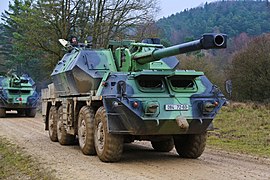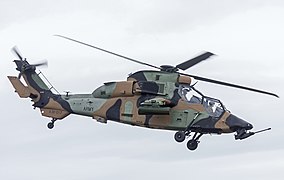Forsvarsstyrken: Difference between revisions
mNo edit summary |
mNo edit summary |
||
| Line 43: | Line 43: | ||
As part of the establishment of the Federal Republic of Littland, the old Armed Forces was disbanded and Forsvarsstyrken was founded in 1913. Under the first Minister of Defence, Mogens Vernersen, the new armed forces were properly set up and updated with modern equipment such as its first tanks in 1923. The new structure, compared to the previous armed forces, focus more on the ability of each soldier and an officer corps that had earned their title and had proper experience as opposed to given officer titles to nobles under the Kingdom. Conscription during this time lasted 12 months. | As part of the establishment of the Federal Republic of Littland, the old Armed Forces was disbanded and Forsvarsstyrken was founded in 1913. Under the first Minister of Defence, Mogens Vernersen, the new armed forces were properly set up and updated with modern equipment such as its first tanks in 1923. The new structure, compared to the previous armed forces, focus more on the ability of each soldier and an officer corps that had earned their title and had proper experience as opposed to given officer titles to nobles under the Kingdom. Conscription during this time lasted 12 months. | ||
In 1963 the Littish Constitution was changed and with it came a reorganization of Forsvarsstyrken. Part of this reorganization included | In 1963, the Littish Constitution was changed, and with it came a reorganization of Forsvarsstyrken. Part of this reorganization included conscription being cut down to 6 months, as well as allowing for opt-out in specific conditions, officially establishing an Airforce branch (having previously operated under the Army) as well as other changes. Also part of the reorganization was the creation of Civilforsvaret which would function as a reserve and incorporated parts of the national emergency management forces. | ||
Conscription was abolished in 2006 and ever since Forsvarsstyrken hasn't been above 250,000 active personnel which some experts say could weaken national security long-term. Most notably was the decrease in military funding from around 6% down to 2,5% of GDP, so new priorities for military spending also followed with the Airforce and Navy getting more funding than the Army. Military spending has slightly increased under current Prime Minister Albert Simonsen, in power since 2016, with the stated goal of eventually reaching 6% within the decade and modernizing the equipment of the Army. The current logo system was introduced in 2012. | Conscription was abolished in 2006 and ever since Forsvarsstyrken hasn't been above 250,000 active personnel, which some experts say could weaken national security long-term. Most notably was the decrease in military funding from around 6% down to 2,5% of GDP, so new priorities for military spending also followed with the Airforce and Navy getting more funding than the Army. Military spending has slightly increased under current Prime Minister Albert Simonsen, in power since 2016, with the stated goal of eventually reaching 6% within the decade and modernizing the equipment of the Army. The current logo system was introduced in 2012. | ||
==Branches== | ==Branches== | ||
| Line 111: | Line 111: | ||
|} | |} | ||
=== | ===Home Guard=== | ||
'''Civilforsvaret''' is Littlands Home Guard and emergency management force. It consists of 23,500 personnel who also acts as the army reserve. Only in times of tension and war can the High Command take command over the Home Guard. The Home Guard uses a variety of different civilian transport vehicles and have the C7 Rifle as their standard rifle. | '''Civilforsvaret''' (''The Civil Defence'') is Littlands Home Guard and emergency management force. It consists of 23,500 personnel who also acts as the army reserve. Only in times of tension and war can the High Command take command over the Home Guard. The Home Guard uses a variety of different civilian transport vehicles and have the C7 Rifle as their standard rifle. | ||
==Structure== | ==Structure== | ||
Revision as of 21:11, 23 May 2022
| Littish Armed Forces | |
|---|---|
| Forsvarsstyrken | |
 | |
| Motto | For land og folk (For country and people) |
| Founded | 1913 |
| Current form | 1965 |
| Service branches | |
| Headquarters | Klinstrup |
| Leadership | |
| Prime Minister | |
| Chief of Defence | |
| Personnel | |
| Military age | 18 years of age |
| Conscription | No (since 2006) |
| Active personnel | 78,000 (2021) |
| Reserve personnel | 23,500 (2021) |
| Expenditure | |
| Budget | $16.2 billion (2021) |
| Percent of GDP | 3,7% (2021) |
Forsvarsstyrken (The Defence Force) is the armed forces of Littland whose purpose is the defence of Littland. It also supports international peacekeeping efforts and provides humanitarian aid. As of 2021 Forsvarsstyrken has a strength of 78.000 active military personnel along with 23,500 in reserve. The current Minister of Defence is Sebastian Anker with Chief of Defence, responsible for more immediate military matters, being Martin Feldt.
History
As part of the establishment of the Federal Republic of Littland, the old Armed Forces was disbanded and Forsvarsstyrken was founded in 1913. Under the first Minister of Defence, Mogens Vernersen, the new armed forces were properly set up and updated with modern equipment such as its first tanks in 1923. The new structure, compared to the previous armed forces, focus more on the ability of each soldier and an officer corps that had earned their title and had proper experience as opposed to given officer titles to nobles under the Kingdom. Conscription during this time lasted 12 months.
In 1963, the Littish Constitution was changed, and with it came a reorganization of Forsvarsstyrken. Part of this reorganization included conscription being cut down to 6 months, as well as allowing for opt-out in specific conditions, officially establishing an Airforce branch (having previously operated under the Army) as well as other changes. Also part of the reorganization was the creation of Civilforsvaret which would function as a reserve and incorporated parts of the national emergency management forces.
Conscription was abolished in 2006 and ever since Forsvarsstyrken hasn't been above 250,000 active personnel, which some experts say could weaken national security long-term. Most notably was the decrease in military funding from around 6% down to 2,5% of GDP, so new priorities for military spending also followed with the Airforce and Navy getting more funding than the Army. Military spending has slightly increased under current Prime Minister Albert Simonsen, in power since 2016, with the stated goal of eventually reaching 6% within the decade and modernizing the equipment of the Army. The current logo system was introduced in 2012.
Branches
Army
Hæren is Littlands Army and consists of 3 divisions, the army is the largest branch of the Littish military with almost 59.000 active personnel. The Army largely focuses of infantry warfare but still has sizeable mechanized and armored capabilities.
Flåden is Littlands Navy and has 74 ships of varying sizes and a combined personnel of around 11.000. The commissioned ships include; 16 frigates, 8 corvettes as well as 50 patrol and auxiliary vessels. The ships, except the patrol vessels, are organized into 3 task forces. Task Force 1 and 3 are stationed at Klinstrup Naval Base while Task Force 2 is stationed at Aalhavn Naval Base. All Task Forces have a varying amount of auxiliary ships.
Airforce
Flyvevåbnet is Littlands Airforce as well as its best maintained and funded branch, it has 8.000 active personnel and 128 aircraft of different types. As of 2021 the Airforce uses 6 air bases around Littland, the largest of these, Kaslund Flyvebase, was originally opened in 1921 and also functions as the headquarters for Flyvevåbenet.
| Flyvevåbnet Inventory (2021) | |||||
| Aircraft | Type | Variant | In service | Notes | |
|---|---|---|---|---|---|
| Eurofighter Typhoon | Multirole | Tranche 3 | 73 | 22 on order | |
| F-10 Vanguard | Multirole | J-10A | 25 | being phased out | |
| Eurocopter Tiger | Attack Helicopter | 10 | flown for the Army | ||
| C-130J Super Hercules | Transport | KC-130J | 2 | ||
| Sikorsky CH-53 | Transport | CH-53GA | 12 | 3 on order | |
| Panavia Tornado | Training Aircraft | 6 | |||
Home Guard
Civilforsvaret (The Civil Defence) is Littlands Home Guard and emergency management force. It consists of 23,500 personnel who also acts as the army reserve. Only in times of tension and war can the High Command take command over the Home Guard. The Home Guard uses a variety of different civilian transport vehicles and have the C7 Rifle as their standard rifle.
Structure
The current structure of the Littish army was changed in 2012 as part of an army reorganization. The 1st Armored Division was created as part of this reorganization. All Divisions are now under the direct command of the Army High Command located in Klinstrup. There are two Infantry Divisions and one Armored Division, the 1st Infantry Division is larger than the 2nd Infantry Division.
![]() High Command, in Klinstrup
High Command, in Klinstrup







